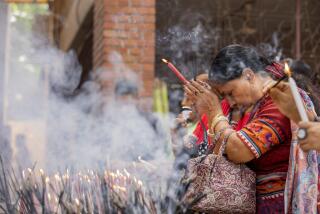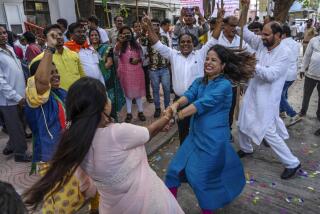Spur Secularism in India
- Share via
India’s most powerful political party should take little solace from its victory in elections in the state of Gujarat this month. Yes, it won big, reversing a series of setbacks for the party in elections in other states in the last few years. But the Bharatiya Janata Party, led by Prime Minister Atal Behari Vajpayee, won on the ashes of those killed in religious rioting this year. For a nation that prides itself on its religious and other forms of diversity, and for being the world’s largest democracy, that’s a pathetic foundation for governing.
Gujarat is a state in western India, just north of Bombay, that was home to Mahatma Gandhi but is also known for its prosperous workaholics. In February, however, it became known for its deadly religious riots. Muslims set fire to a train carrying Hindus back from a disputed religious site, killing 59. Hindus rampaged through the streets in response, killing at least 1,000 people, most of them Muslims. Months later, burned-out cars and piles of bricks from destroyed houses littered the heart of the riot area. One block was finally cleaned up hours before an August visit by India’s president.
The state’s chief minister, Narendra Modi, did little to stop the riots. Far from apologizing, he campaigned as the man needed to protect Hindus against neighboring Pakistan, home to a Muslim majority. After the election, Modi said his priorities would be “progress, security and development.” That’s a welcome change from putting “Hindu-ness” first, as he did in the campaign. Vajpayee also promised to protect everyone’s life and property and build a nation free of discrimination. Vajpayee’s party is built on a bedrock of Hinduism, but the national elections aside, it has lost a series of state elections over local and very secular issues like jobs and safety.
More than 80% of Indians are Hindu, but since independence in 1947, successive governments have stressed their concern for the rights of other religions. Periodic bloodbaths have tested that resolve, most notably the massacres at the time of independence as many Muslims fled to what is now Pakistan and Hindus crossed into India. Gujarat’s government needs to show commitment to secular rule by doing more to punish the rioters and to resettle Muslims forced to flee.
More to Read
Sign up for Essential California
The most important California stories and recommendations in your inbox every morning.
You may occasionally receive promotional content from the Los Angeles Times.













